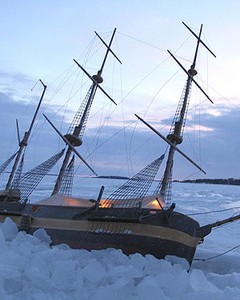Ice Melt Encourages Lost Arctic Ships Search
by Nick Meo/Sail-World Cruising on 17 Aug 2008

HMS Terror, trapped in ice SW
More than 160 years after they vanished into the northern ice on a doomed mission to find a North West Passage to Asia, an expedition will set off in search of the lost ships of Victorian explorer Sir John Franklin, the HMS Erebus and the HMS Terror.
The last recorded sighting of Franklin's vessels was on July 26, 1845 If the Canadian Coastguard's sonar manages to locate the remains of HMS Erebus and HMS Terror, they will solve one of the great mysteries of maritime exploration.
The last recorded sighting of the two vessels and their 128 hand-picked officers was on July 26, 1845, two months after they had set sail from Greenhithe in Kent on a mission to chart the North West Passage. Their failure to make to their intended destination of China sparked one of the longest rescue missions in maritime history, in the course of which the passage was finally located after centuries of failed efforts.
Of the Franklin expedition itself, however, only rumours of starvation, madness and cannibalism filtered back to London, based on the reports of Inuit people in the Arctic wastes north of Canada, who reported a group of white men trapped by the ice and slowly dying of hunger. In the 1980s the frozen bodies of two seamen and a petty officer in an ice-filled coffin were found.
The new expedition will be led by Robert Grenier, a senior underwater archaeologist with Parks Canada.
He said: 'It's very exciting. It's like an Indiana Jones adventure.' He pledged to protect the wrecks, adding: 'They are in danger of being found by people who don't have the know-how and the same intention and preoccupation that we have.' There have been reports of Hollywood producers offering money to local Inuit for information about the wrecks' location.
The shipping passage that Franklin was searching for claimed the lives of some of history's foremost mariners. It could have cut the journey from London to China and lucrative British markets in the East by half, but arduous polar conditions and year-round ice meant that it was impassable and existed only on maps and in the imaginations of explorers.
Now, however, experts believe that climate change is melting polar ice at such a fast rate that the North West Passage could become navigable within a couple of decades. Control of it will be of strategic importance and highly lucrative. Charges to use the Suez canal are worth billions of pounds each year, and much of that commerce would switch to the quicker northern route.
Canada's Environment Minister John Baird said: 'The Franklin Expedition is a key part of Canada's history of Arctic exploration. As Canada is once again asserting ourselves and protecting our sovereignty in the High Arctic, this expedition will provide important new information and will add to the body of research on the fate of these ships.'
There are doubts, though, whether the wrecks still exist. Seamen stranded by polar ice would use wood from the structure to build winter quarters in order to survive, rebuilding the ship in the spring. Franklin's crew, however, may well have become so desperate that they could have used it for fuel.
Background:
Franklin's lost expedition was a doomed British voyage of Arctic exploration led by Captain Sir John Franklin that departed England in 1845. A Royal Navy officer and experienced explorer, Franklin had served on three previous Arctic expeditions, the latter two as commanding officer. His fourth and last, undertaken when he was 59, was meant to traverse the last unnavigated section of the Northwest Passage. The entire expedition complement, Franklin and 128 men, died of causes natural and unnatural after their ships became icebound in Victoria Strait near King William Island in the Canadian Arctic.
Pressed by Franklin's wife and others, the Admiralty launched a search for the missing expedition in 1848. Prompted in part by Franklin's fame and the Admiralty's offer of a finder's reward, many subsequent expeditions joined the hunt, which at one point in 1850 involved eleven British and two American ships. Several of these ships converged off the east coast of Beechey Island, where the first relics of the expedition were found, including the graves of three crewmen.
In 1854, explorer John Rae, while surveying near the Canadian Arctic coast southeast of King William Island, acquired relics of and stories about the Franklin party from the Inuit. A search led by Francis Leopold McClintock in 1859 discovered a note left on King William Island with details about the expedition's fate. Searches continued through much of the 19th century.
In 1981, a team of scientists led by Owen Beattie, a professor of anthropology at the University of Alberta, began a series of scientific studies of the graves, bodies, and other physical evidence left by Franklin crew members on Beechey Island and King William Island.
They concluded that the crew members whose graves had been found on Beechey Island most likely died of pneumonia and perhaps tuberculosis and that lead poisoning from badly-soldered cans was also a likely factor. Cut marks on human bones found on King William Island were seen as signs of cannibalism. The combined evidence of all studies suggested that cold, starvation, lead poisoning, and disease including scurvy killed everyone on Franklin's last expedition.
After the loss of the Franklin party, the Victorian media, notwithstanding the expedition's failure and the reports of cannibalism, portrayed Franklin as a hero. Songs were written about him, and statues of him in his home town, in London, and in Tasmania credit him with discovery of the Northwest Passage. Franklin's lost expedition has been the subject of many artistic works, including songs, verse, short stories, and novels, as well as television documentaries.
If you want to link to this article then please use this URL: www.sail-world.com/47816